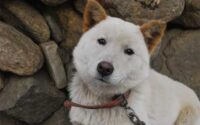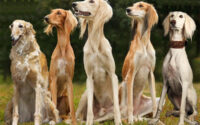Lancashire heelers
Amid the panorama of dog breeds, the Lancashire Heeler stands out as a tenacious and capable herding dog with roots firmly planted in the pastoral landscapes of England. This diminutive yet robust canine is imbued with a rich heritage and possesses a charming persona that belies its workmanlike demeanor. As we explore the facets of this breed, from its history to its health considerations, potential owners and dog enthusiasts alike will gain insight into the world of Lancashire Heelers—a breed that may be small in stature but is colossal in heart and spirit.
Lancashire Heelers: A Breed Overview
Table of Contents

The Lancashire Heeler is often recognized for its pert ears, keen expression, and agile form. Weighing in at a modest 6 to 13 pounds and standing 10 to 12 inches at the shoulder, this breed is known for its versatility and can undertake roles ranging from herding livestock to being a companionable household pet. They exhibit a short, dense coat, predominantly black or liver, with rich tan markings. With a life span of 12 to 15 years, Heelers are generally a long-lived breed. They are celebrated for their intelligence, loyalty, and spirited disposition, making them an endearing choice for many dog owners.
Origins of the Heeler: Lancashire’s Gem

Tracing back to the 17th century, the Lancashire Heeler’s lineage is thought to intertwine with that of the Welsh Corgi and the Manchester Terrier. Originating from the county of Lancashire in England, these dogs were bred to herd cattle and sheep, adeptly nipping at the heels of livestock—a task from which their name derives. Their compact size allowed them to avoid kicks from larger animals, while their spirited demeanor enabled them to control herds with assertive ease. Despite their practical beginnings, the breed faced a decline by the mid-20th century, only to be revived by dedicated enthusiasts who recognized their unique characteristics and working capabilities.
The Heeler’s Distinctive Traits

Lancashire Heelers are distinguished by several key characteristics:
- Size and Build: Compact and robust, they are small yet sturdy.
- Coat: Their smooth, weather-resistant coat comes in black and liver colors, with tan markings.
- Ears and Eyes: Their ears are erect, and eyes are almond-shaped, conveying a sharp and lively expression.
- Temperament: Known for their intelligence, they are quick learners and are both affectionate and spirited.
- Adaptability: While they have a strong herding instinct, they are also well-suited to various activities and living environments.
- Heeling Ability: True to their heritage, they have a natural tendency to heel, making them excellent working dogs in pastoral settings.
Training Your Lancashire Heeler

Training a Lancashire Heeler can be a rewarding experience due to their intelligent and eager-to-please nature. Starting training early is crucial, and it should always be consistent and positive. Socialization is key to developing a well-rounded dog, and exposure to different people, pets, and environments can help prevent shyness or aggression. Due to their herding instincts, Heelers may try to nip at people’s heels, a behavior that should be redirected early on. They excel in obedience and agility training, thanks to their quick reflexes and problem-solving skills. Lastly, their strong bond with their owners makes them responsive to commands, as they often seek to please their human companions.
Health Considerations for Heelers

While Lancashire Heelers are generally robust and healthy dogs, they are subject to certain health conditions that prospective owners should be aware of:
- Primary Lens Luxation (PLL): This genetic eye condition can lead to blindness if not treated.
- Collie Eye Anomaly (CEA): Another hereditary condition affecting the eyes, though less common.
- Patellar Luxation: A common issue in smaller breeds, where the knee cap slips out of place.
- Hereditary Cataracts: Can develop at any age and potentially cause vision impairment.
- Deafness: Congenital deafness can occur in the breed, and testing is advisable.
Regular vet check-ups, a nutritious diet, and adequate exercise can contribute to the overall health and longevity of a Lancashire Heeler. Annual health screenings for genetic conditions are recommended for this breed.
Finding a Reputable Heeler Breeder

When seeking a Lancashire Heeler, it’s paramount to find a reputable breeder who prioritizes the health and well-being of their dogs. Quality breeders will provide health clearances for both parents and allow you to visit and see the conditions in which the puppies are raised. They should be knowledgeable about the breed and willing to answer any questions regarding the puppy’s care and potential health issues. Additionally, a good breeder will show a genuine interest in where their puppies are placed, often asking buyers extensive questions to ensure a suitable match. Be wary of red flags such as unwillingness to show parental health records or a lack of transparency about their breeding practices.
Comparison Table: Lancashire Heeler vs. Other Heeler Breeds
| Trait | Lancashire Heeler | Australian Cattle Dog | Blue Heeler |
|---|---|---|---|
| Size | Small (10-12 inches) | Medium (17-20 inches) | Medium (17-20 inches) |
| Coat Colors | Black or liver with tan | Blue or red speckle | Blue with or without markings |
| Lifespan | 12-15 years | 13-15 years | 13-15 years |
| Temperament | Affectionate, Spirited | Alert, Curious | Energetic, Loyal |
| Ideal Environment | Versatile, adaptable to urban or rural | Best suited for active homes with space | Requires extensive physical activity and space |
| Herding Instinct | Strong | Very strong | Very strong |
In summary, the Lancashire Heeler is a breed that encapsulates the spirit of its pastoral heritage while seamlessly integrating into the role of a beloved family pet. Their distinctive traits and affable nature make them a unique and rewarding companion. For those considering bringing a Heeler into their lives, understanding the breed’s history, training needs, health considerations, and choosing a responsible breeder are crucial steps. With the right care and environment, a Lancashire Heeler can prove to be a loyal and active member of any household, embodying the timeless charm of England’s canine legacy.



